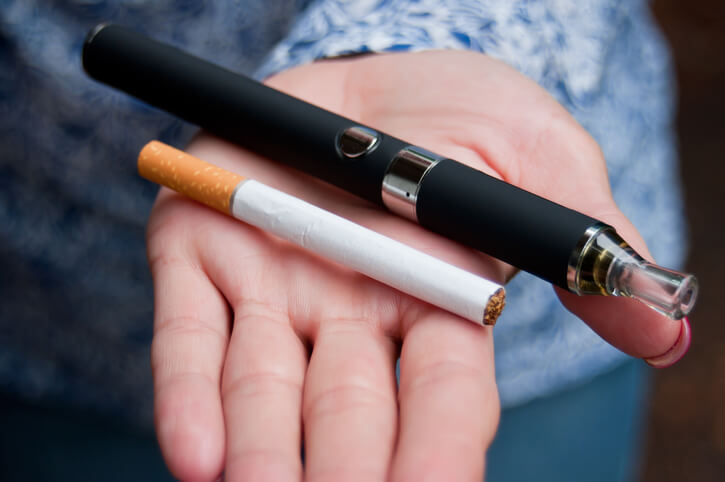Asthma and Smoking

Smoking irritates airway linings and can cause or worsen asthma symptoms. That’s true whether an asthma patient smokes or is exposed to secondhand smoke.
Tobacco smoke affects adults and children, so parents should understand the link between smoking and asthma and avoid smoking around their kids. That’s especially important for children with asthma.
Can Smoking Cause Asthma?
Can tobacco cause asthma? That’s a common question from people who smoke or are exposed to secondhand smoke. Research on smoking and asthma is challenging for several reasons, including that it’s hard to measure tobacco smoke exposure.
However, based on the results of many studies, researchers believe that smokers are more likely to develop asthma. Female smokers appear to have an especially high risk of asthma compared to nonsmokers.
So, can smoking cause asthma? It seems that it can. The good news is that while it can be difficult to quit smoking, there are people every day who succeed in giving up the habit.
What Happens if You Smoke with Asthma?
Does smoking make your asthma worse? Research shows that it does. People with asthma who smoke have a higher risk of experiencing severe symptoms and a reduced quality of life.
Smoking with asthma also increases your risk of dying from the disease. In addition, people with asthma who smoke while pregnant are more likely to increase the risk of fetal growth abnormalities.
Again, there’s hope for smokers who have asthma since they can quit. Avoiding smoking, along with using asthma treatments, can lead to a greatly improved quality of life — not to mention a reduction in risks related to secondhand smoke for family and friends.
Vaping and Asthma
The use of e-cigarettes (called “vaping”) is considered somewhat less harmful than smoking. While vaping solutions contain nicotine, they have fewer harmful substances than cigarette smoke.
Still, can vaping cause asthma? Research indicates it increases the likelihood of chronic lung diseases, including asthma. People with asthma who vape also tend to suffer more attacks and miss more school or work due to severe symptoms.
How Does Vaping Affect Asthma?
Vaping affects asthma in several ways. For example:
- Vaping solution chemicals may increase mucus production, cough, and chest tightness. They may also reduce lung function.
- Some vape solution additives may cause cell damage.
- Vaping irritates airways and causes dry throat and coughing, increasing the risk of asthma attacks.
- Vaping may reduce the lungs’ ability to fight infections, including making it easier for pneumonia-causing bacteria to stick to cells.
In short, vaping is an unhealthy practice that can be particularly harmful to people with asthma.
Can Secondhand Smoke Affect My Asthma?
The combination of smoke from a burning cigarette and exhaled by a smoker is what doctors call secondhand smoke. Can secondhand smoke cause asthma? Yes, it can.
Researchers have found that people who live with a smoker are more likely to develop chronic lung conditions. Secondhand smoke can also trigger or worsen asthma symptoms.
Thirdhand Smoke and Asthma
Another concept to understand with asthma and smoking is the effect of thirdhand smoke. Thirdhand smoke is residual nicotine and other chemicals on surfaces exposed to smoke. These substances can linger on furniture, walls and clothing, potentially triggering asthma symptoms in environments that are otherwise smoke-free. Consequently, it’s crucial to do all you can to keep those surfaces clean.
Can Smoking During Pregnancy Affect Asthma in Children?
Smoking while pregnant can impact fetal development, increasing the risk of asthma. Children of mothers who smoke while pregnant can have impaired lung development and higher sensitivity to asthma triggers. To avoid asthma caused by smoking, you should try to give up the habit while pregnant and ideally permanently to benefit your health.
How to Manage Asthma When You Can’t Avoid Places with Smoke
It’s not always possible to avoid secondhand smoke. If you can’t, it’s crucial to take your asthma medications as directed. And if your situation changes and your exposure to secondhand smoke increases, you should talk with your doctor. They may recommend changes to the amount or frequency of your medications.
Reducing the Risks of Asthma and Smoking
The best thing you can do to minimize your risk of asthma attacks is to quit smoking. That’s not easy, but you can do it, and your doctor can help.
You can increase your chances of successfully quitting by taking steps like:
- Talking with your doctor about nicotine replacement strategies like gum or patches
- Choosing a date when you’ll stop smoking
- Discarding all your cigarettes, ashtrays, and lighters
- Asking others not to smoke in your home
- Chewing gum or eating finger foods like carrot sticks when you have the urge to smoke
- Finding other things to do when you typically smoke, such as taking a walk after dinner instead of having a cigarette
- Practicing deep breathing techniques to give yourself time to make the right choice when you feel the urge to smoke
Keep in mind that quitting is a process, and don’t give up if you don’t succeed immediately.
Where To Get Help To Quit Smoking or Vaping
If you struggle to quit smoking, there are resources that can help. Some of them include:
- National quitlines, like 1-800-QUIT-NOW
- Local smoking cessation programs offered by Baptist Health
- Online tools and mobile apps
If you have questions about quitting smoking and asthma, your provider can answer them.
Talk with Your Baptist Health Doctor About Asthma
If you have asthma, our asthma and allergy care experts can help you manage it. And when you’re ready to quit smoking, your primary care doctor can assist you. If you don’t have a Baptist Health physician, you can find one using our online provider directory.
Better asthma control and better health are possible! Take action today.
FAQ
Will My Asthma Go Away If I Quit Smoking?
Quitting smoking won’t cure asthma, but it can significantly reduce your symptoms and risk of asthma attacks. It will also improve your overall lung health and lower your risk of various cancers.
What Is Worse for Asthma, Smoking or Vaping?
Smoking and vaping both worsen asthma symptoms. Research is ongoing, but some results point to vaping increasing the risk of asthma symptoms, including coughing, wheezing and shortness of breath.
Does Nicotine Gum Worsen Asthma?
Nicotine gum can affect the body in ways that aren’t helpful for people with asthma. If you have asthma and are trying to quit smoking, it’s important to talk with your healthcare provider.



